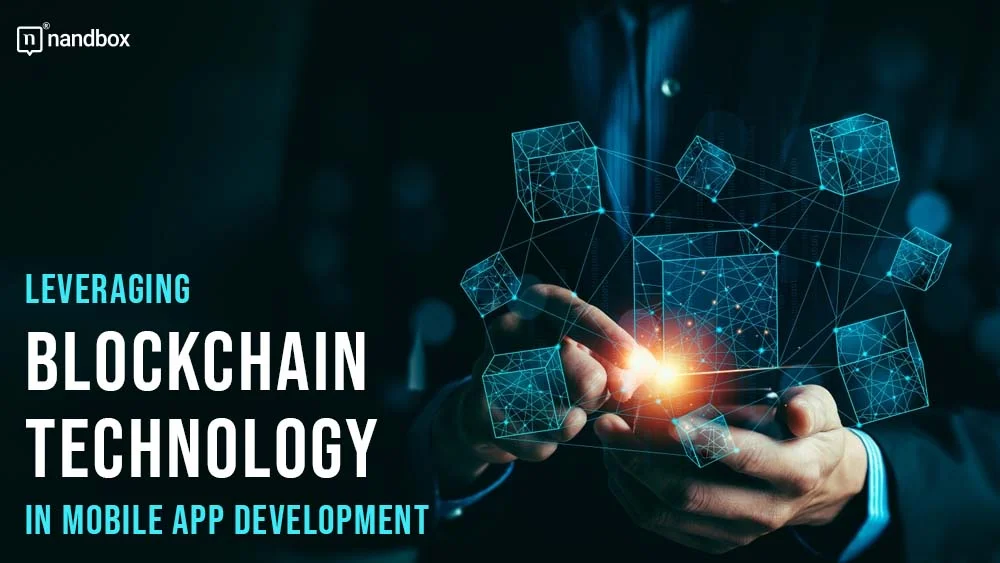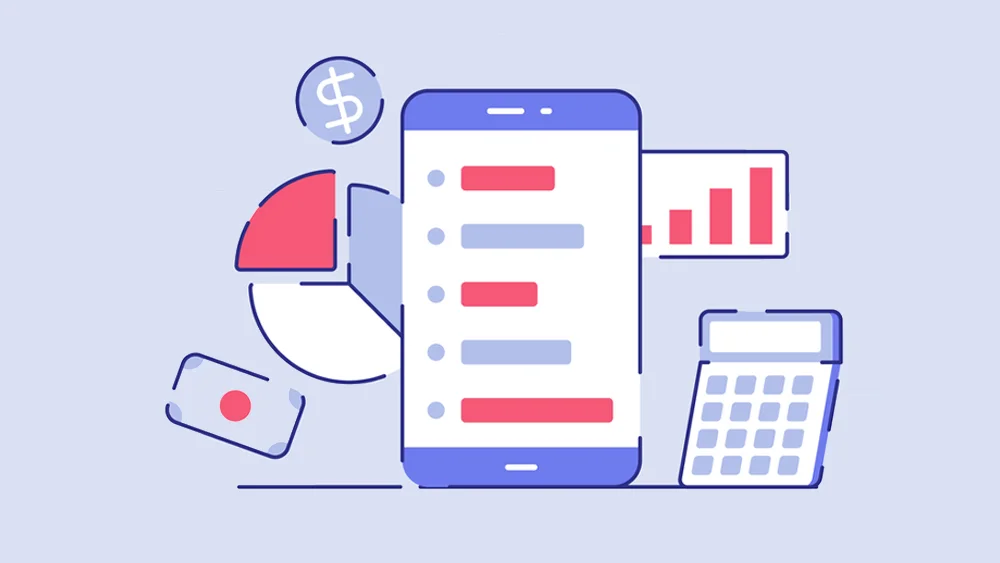Mobile apps have come a long way since the early days of the smartphone, when the technology first became commonplace in the late 2000s. Back then, people used to joke that there was an app for everything! Nearly two decades later, we live in a reality where there truly are apps for almost anything you could possibly need.
Mobile applications have brought unprecedented convenience to society in various ways. Apps have massively changed industries such as:
- Communication;
- Education and Learning;
- Health and Fitness;
- Navigation and Travel;
- Personal Finance;
- And so much more.
Let’s explore the exciting potential of blockchain technology in mobile app development and how these innovative changes can inspire a new era of digital interactions in our daily lives.
What is Blockchain Technology?
When people hear about blockchain technology, the first thing most think of is cryptocurrency and trading community. Of course, the concept of the blockchain has historically been utilized by cryptocurrencies like Bitcoin and Ethereum, so this assumption is not at all unfounded.
Nevertheless, although these decentralized currencies still heavily use blockchain, applications of blockchain technology have begun to move beyond crypto and into other industries.
Understanding Blockchain Technology
Imagine living in a neighborhood where history is permanently recorded in a special notebook. Once someone writes something in this notebook, there’s no way to erase or alter the information because everyone has a copy of the same notebook.
When one person adds a new page to their notebook, everyone else also gets the same page in theirs, ensuring that each person has a copy of everything added so far. If someone tries to change what’s written, it will be impossible because a quick check will reveal that the information doesn’t match everyone else’s notebooks.
To summarize:
- Everyone has a copy of the notebook
- When someone adds a page, everyone else also adds the same page
- There is no way to alter the information on the page.
The neighborhood’s system is designed in such a manner that it enhances three primary characteristics:
- Trust. Since everyone in the neighborhood has the same level of visibility and can see and read what anyone writes, it is virtually impossible to lie or cheat to gain an advantage. Everyone is on the same playing field.
- Security. Security is a cornerstone of blockchain technology. The other residents would immediately detect any attempt to alter the contents of the ‘notebook,’ ensuring the integrity of the information.
- Transparency. There are no hidden pages in the ‘notebook ‘; everyone has complete visibility of what is written in every notebook, promoting trust and accountability.
Now, this analogy can be used to visualize how blockchain technology can be utilized in everyday life. Picture a system of transactions (financial or otherwise) where there is an extremely low risk of fraudulent behavior because there is no single point of failure.
However, the benefits of using blockchain technology go far beyond reducing fraud. Let’s explore how apps can actually utilize and leverage blockchain tech.
Applications of Blockchain Technology: Blockchain in Mobile App Development
Let’s explore the diverse applications of blockchain technology today, many of which are relevant to mobile app development and showcase its versatility and potential.
Cryptocurrencies
Of course, we have what started it all—cryptocurrencies. Cryptocurrencies like Bitcoin and Ethereum utilize blockchain as a secure and decentralized method of executing digital transactions.
To this day, cryptocurrencies are still responsible for most blockchain use, although some industries are becoming more receptive to blockchain.
Financial Services
Blockchain is increasingly being adopted in the financial sector, offering enhanced security beyond just cryptocurrency. It has applications in cross-border payments, asset management, clearing and settlement, and insurance, providing a secure and reliable platform for financial transactions.
- Cross-border payments. Because intermediaries are eliminated, cross-border payments with blockchain will take much less time and cost less.
- Asset Management. Asset management via tokenization allows for a more straightforward trading process, making assets more accessible and liquid.
- Clearing and Settlement. Blockchain allows for real-time securities settlement versus the several days it would take to use a traditional clearing and settlement process.
- Insurance. Blockchain can be beneficial for automating insurance claims and ensuring that claims are paid out on time.
Healthcare
Blockchain also has room in healthcare. A decentralized system can be an excellent way to store and share medical records, with its reduced risk for fraud and tampering. Due to the sheer volume of sensitive information handled in the industry, such a system would benefit the healthcare system as a whole.
Moreover, pharmaceutical manufacturers could also utilize blockchain to track the production and distribution of pharmaceuticals, thereby helping reduce the entry of counterfeit drugs into the market.
If there is no single point of failure in the distribution process, and every step is tracked, it would be easier to pinpoint counterfeiting and reduce the likelihood of counterfeit drugs landing in the market.
Real Estate
Blockchain technology can be helpful in ensuring the safety and security of property transactions. Ownership details and any relevant transaction history are reported appropriately to reduce the need for third-party services.
Government institutions can also benefit from a distributed ledger as a means of maintaining land registries, limiting fraud, and simplifying property transfers.
Philanthropy
Charity is another industry that could greatly benefit from blockchain applications. Over the last decade, it has become increasingly easier to donate to your chosen causes through crowdfunding apps.
People or groups needing financial assistance can easily create their own campaigns on numerous crowdfunding platforms available on the market.
Blockchain can enhance the charity and donations space by ensuring donations reach their intended recipients through a completely transparent and traceable record of transactions.
Using Blockchain Technology in Mobile App Development
Now that you have a better grasp of how blockchain technology affects many digital interactions, let’s examine how to apply blockchain to app development. While blockchain offers many benefits to different spheres, from healthcare to e-learning app developers, such as secure identity management and transparent transaction tracking, it also presents challenges like scalability and user adoption that developers need to consider.
Incorporating AI and insurtech into blockchain-based apps can further enhance functionalities like fraud detection and automated claims processing. Also, by leveraging AI and insurtech, developers can create more efficient and reliable applications that meet the evolving needs of users in the insurance industry.
Identity Management
Securely managing identities, especially in industries like healthcare or finance, can be somewhat challenging. Numerous factors must be considered, and data privacy is always going to be a concern for users.
Blockchain technology allows developers to utilize decentralized identity management systems in which users are in total control of their data and privacy. Moreover, blockchain can be used for authentication, thereby reducing (and potentially eliminating) the need for usernames and passwords.
This significantly enhances mobile app data security by ensuring that user information is protected through robust encryption and decentralized storage. Also, by integrating blockchain, developers can address mobile app data security concerns more effectively, providing a higher level of trust and safety for users.
Smart Contracts
Smart contracts are essentially contracts programmed to self-execute when the agreement’s parameters are met. The terms of the contract are written into the code itself, reducing the need for intermediaries and increasing transaction efficiency.
Mobile app developers can use smart contracts as a way to automate payments, agreements, and task execution.
Smart contracts have the benefit of:
- Automation;
- Security;
- Cost reduction;
- Reliability;
- Speed; and
- Versatility
Moreover, smart contracts can be used in many industries, such as real estate, healthcare, gaming, and even the legal industry.
Developers can utilize smart contracts to create mobile apps that prioritize user convenience without sacrificing user safety and data privacy. By auditing a smart contract, they can further enhance the app’s security, ensuring that it operates as intended and protecting users from potential vulnerabilities.
Digital Assets
Digital assets include a wide range of different types, some of which may be more familiar than others. They are essentially anything that can be stored digitally and provides some value to the owner.
Here are several examples of traditional digital assets:
- Photos
- Videos
- Animations
- Documents
- Illustrations
- Manuscripts
- Logos
- Social Media Accounts
- Books
However, blockchain technology has brought with it new types of digital assets, such as:
- Nonfungible tokens (NFTS);
- Cryptocurrency;
- Tokenized Assets;
- Security Tokens;
Among others. As more of human society moves to the digital landscape, there will also be an increased need for applications with the capacity to manage digital assets.
Mobile app developers can utilize blockchain and create applications that enable users to trade, buy, and sell assets as securely as possible.
Decentralized Storage
You’ve probably heard the adage, “Don’t keep all your eggs in one basket.” This saying applies to many aspects of life, including finances, risk, and storage.
Imagine storing all your accumulated data—photos, videos, and files—on a single server. If that server is destroyed by a natural disaster and there are no backups, your data is lost forever.
Decentralized storage mitigates this risk. Instead of hosting data in a single location, apps can use decentralized storage solutions like IPFS to manage the risk of data loss and tampering.
Instead of hosting your data on one server, it is broken into multiple chunks and stored across various nodes, with copies in other nodes. This way, if any server experiences an issue, you won’t lose all your data.
Think of it as losing just a day’s worth of data versus losing all the data accumulated over your entire online life. Even if a node fails, you can retain your data if a duplicate is stored elsewhere.
Some of the benefits of decentralized storage systems are:
- Improved security (thanks to encryption);
- Enhanced privacy;
- Increased reliability;
- Scalability;
- Censorship resistance;
And more. If you’re looking to learn more about decentralized storage, try checking out these platforms:
- IPFS (InterPlanetary File System)
- Filecoin
- Storj
- Sia
Final Thoughts
Blockchain technology can be a complex concept to grasp, especially for regular, non-technical folk. We are so used to centralized systems that accepting different ones can be challenging.
But like any meaningful change, integrating blockchain technology into our daily mobile app development will require time and the discomfort of using something new. As more developers start to leverage blockchain technology in mobile applications, users will also become more knowledgeable about how blockchain can improve our daily digital transactions.
And who knows? Maybe a decade from now, the mobile app landscape will fully embrace blockchain technology and the many benefits it provides to the digital space.
Author bio:
Roy Emmerson is the co-founder of TechTimes.com, a B2B SaaS platform that helps businesses stay up-to-date on the latest technology trends. With over a decade of experience in the tech industry, Roy is a thought leader in the field and is passionate about helping companies embrace new technologies to improve their operations and drive growth.





